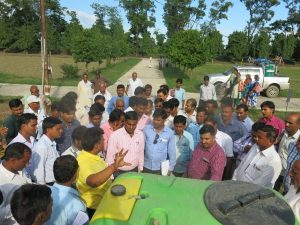Innovative Partnerships to Expand Technology Adoption
Partnering with Krishi Vigyan Kendras, CSISA aims to disseminate new knowledge and farming practices in India.
The Krishi Vigyan Kendras (KVKs), which roughly translates into farm science centers, are a unique feature of the National Agriculture Research and Extension System in India. Spread across the country, these centers employ strong multi-disciplinary teams of scientists who possess expertise in research and extension and play a crucial role in carrying out front-line demonstrations. These centers are well positioned to play a strategic role in linking research outputs and priorities with extension activities. At present, however, most KVKs do not generate information on technology performance or farmer’s preferences. This represents a significant missed opportunity in terms of a feedback mechanism constantly providing district-specific data that could feed into investment priorities of a state.

In Phase III, working in partnership with KVKs from state agricultural universities and research organizations within the Indian Council of Agricultural Research (ICAR) is central to CSISA’s strategy for technology mainstreaming. In June, a four-year agreement was signed with ICAR that enables KVKs in eastern India to conduct collaborative research with CSISA to evaluate and refine existing management recommendations for farmers. The objective of this unique partnership model is to bring together the best from the national and international agriculture research systems.
Working with select KVKs, CSISA aims to demonstrate how these centers can be leveraged to improve the quality and relevance of agricultural research science conducted in the country, and to increase their potential to boost farmer-to-farmer transfer of information on sustainable intensification technologies and practices. Rabi (winter) season planning meetings between KVKs and CSISA, held in September and October, focused on refining activities, setting priorities, and consulting with key stakeholders such as the Orissa University of Agriculture and Technology.
In this partnership, CSISA will support the KVKs by providing strategic guidance on research priorities, as well as on topics such as monitoring, learning and evaluation and Open Data Kit for mobile data collection. So far, 8 KVKs have taken up specific research activities related to identifying policy solutions that support the adoption of sustainable intensification technologies at scale.
Research activities include studying the performance of short-duration and long-duration crop varieties under different sowing schedules across ecologies, assessing the role of supplemental irrigation during terminal heat in wheat, understanding the effect of boron deficiency-induced sterility in wheat and its effect on the crop’s yield and yield attributes, and studying the response of nitrogen and phosphorus applied to timely-sown and late-sown wheat.